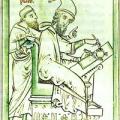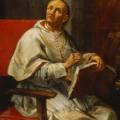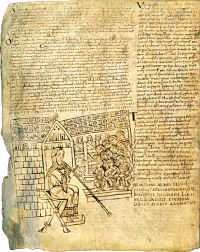202. Philosophers Anonymous: the Roots of Scholasticism
Posted on
Little-known authors prepare the way for scholasticism with glosses on logic, metaphysical debate, and a poem about a cat.
Themes:
Further Reading
• J.J. Contreni, Carolingian Learning: Masters and Manuscripts (Aldershot: 1992).
• B.S. Eastwood, Ordering the Heavens: Roman Astronomy and Cosmology in the Carolingian Renaissance (Leiden: 2007).
• M. Gibson, Lanfranc of Bec (Oxford: 1978).
• C.E. Lutz, Schoolmasters of the Tenth Century (Hamden: 1977).
• J. Marenbon, From the Circle of Alcuin to the School of Auxerre (Cambridge: 1981).
• M. Teeuwen and S. O’Sullivan (eds), Carolingian Scholarship and Martianus Capella (Turnhout: 2011).
Online images of glosses on Martianus Capella
Several versions of the Old Irish poem “Pangur Ban”







Comments
Irish scholars
The whole question of 9th century scholars from Ireland is very interesting. One wonders why it is that the Irish monasteries, on the edge of the known world, produced such preeminent scholars, and how they came to have such good access to Greek texts especially. And yet their most lasting contributions seem to have been made once some of them had left their homeland.
In reply to Irish scholars by Ambrose Gilson
Irish scholars
I agree, this is a fascinating phenomenon. There is a popular book on the subject (which I haven't read) called "How the Irish Saved Civilization", that might be worth checking out: http://www.amazon.com/How-Irish-Saved-Civilization-Irelands/dp/03854184…
In reply to Irish scholars by Peter Adamson
I have read the book - it is
I have read the book - it is very light. The author appears to interpret everything through a particular political lens. Consequently, some of the statements and conclusions are remarkable.
In reply to Irish scholars by Ambrose Gilson
Non-Irish Irish monks
I learned now that even the Reichenau scholars started by Irish roots (cf. e.g. http://en.wikipedia.org/wiki/Wetti_of_Reichenau )
Yet in the Amazon description of the book "Irische Mönche in Süddeutschland" they write that being an Irish monk was so special in these days that even non-Irish monks were considered to be Irish - which makes things more complicated :-)
the Irish diaspora
Hi Peter,
thanks for this version of Pangur Bán - I had forgotten Auden's translation.
I had always assumed that it was the vellum parchment with poem that had travelled rather than the scholar. However, with the scholarly diaspora from Ireland, it makes sense that it was written by a scholar living far away.
I wonder if the poem was preserved after the death of the scholar because the other monks came across this fragment in a language they could not read, and assumed that it was a work of great importance to be translated the next time an Irish monk visited the monastery, and it was then forgotten.
The Irish scholars are one of the gaps that you are filling - it seems that they preserved the study of Philosophy during the collapse of the Western Roman empire.
Add new comment